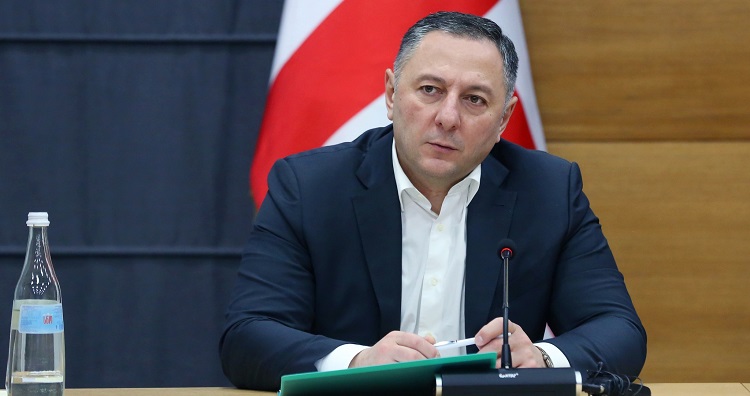Interior Minister says “appropriate, proportional” measures will be taken against “violent, unlawful assembly”

He stressed it was “unacceptable” for politicians and other local and foreign entities to “incite people” to commit crimes for which “strict criminal liability is envisioned by the law”. Photo via Interior Ministry
Georgian Interior Minister Vakhtang Gomelauri on Sunday said the right to peaceful assembly in Georgia was ensured at “a high standard”, but in case of “violent and unlawful” assembly the state was empowered to take “appropriate, proportional measures”.
At a press briefing, Gomelauri made comments over the planned rally against the controversial domestic bill on transparency of foreign influence and noted according to the public statements made by the politicians as well as operational information, the Ministry was informed that the gathering was planned to take “a violent and illegal character” within the next two days.
The Minister emphasised that the participants of the rally planned to attempt to block the entry ways of the Parliament of Georgia and hinder the members and staff of the legislative body from entering the building and stressed the above-mentioned actions were punishable by imprisonment for a term of up to four years.
In recent years, a disproportionately loyal practice was formed with regards to the above-mentioned article of the Criminal Code of Georgia, which, as experience has shown, had a negative impact on the prevention of the corresponding crime. Therefore, based on the interests of the state, we consider ourselves obliged to apply the mentioned article proportionally to the violators of the law, and in case of committing the crime, to apply Article 222 of the Criminal Code without any exception”, Gomealuri said.
He stressed it was “unacceptable” for politicians and other local and foreign entities to “incite people” to commit crimes for which “strict criminal liability is envisioned by the law”.
It is not our desire, several hundreds of our fellow citizens or foreigners, to become the object of strict criminal liability. However, it is an obligation of the state to ensure the rule of law and to respond to violations of the Criminal Code with appropriate measures”, the Minister added.
Gomelauri expressed hope that “as few people as possible” would get involved in the “provocation plotted by politicians and other local as well as foreign entities” to avoid the “severe punishment” that is envisioned for the above-mentioned crime against public security and order.
 Tweet
Tweet  Share
Share